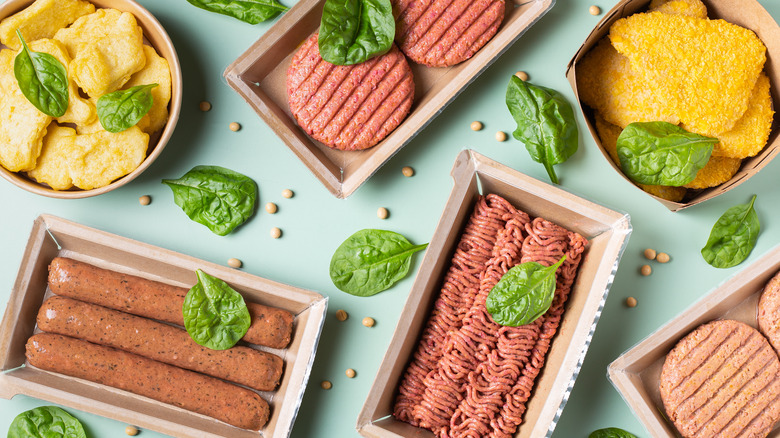How France Is Setting A New Standard For Plant-Based Food
Any gastronome's film canon isn't complete without 1987's "Babette's Feast." Set in the late 19th century, the film follows a Parisian refugee who shows gratitude to her pious Danish hosts by using her lottery winnings to prepare an extravagant meal for the whole town — one steeped strongly in French tradition, complete with wine pairings. In other words, a far cry from the townspeople's humble bread soup.
One pivotal scene sees Babette preparing all manner of dishes that many American viewers (especially vegans and vegetarians) might shiver at the thought of eating, like turtle soup and cailles en sarcophage (quail in puff pastry shells with foie gras and truffle sauce, later immortalized in a New York Times recipe). The film is a perfect example of the meat-centric delicacies that have historically taken center stage in French cuisine. (While we're on the subject, you might want to stop eating frog legs).
But for all the birds, game, fish, and amphibians on France's historical menu, the country has been quick to welcome plant-based foods with open arms. This October, France will become the first country in the European Union to take a unique step in the plant-based market, and it all comes down to semantics.
France is bidding adieu to 'meat' labels on plant-based foods
France will be the first country in the EU to ban plant-based food brands from labeling their products with words like "fish," "meat," "steak," "sausage," and the like, per a Thursday statement relayed by The National. Starting in October 2022, "it will not be possible to use sector-specific terminology traditionally associated with meat and fish to designate products that do not belong to the animal world and which, in essence, are not comparable," reads the decree. The move follows a similar Europe-wide ban of words like "milk," "butter," and "cheese" on dairy alternative products.
By being more clear with its plant-based labels, France hopes to "provide consumers with a little more transparency" that "might even affect sales," per The National. It turns out food labels make a huge impact on shopper's decisions. According to a Meatless Farm and Brakes survey cited by Metro UK, over half of polled consumers preferred the term "plant-based" over "vegan" when shopping for meat-free protein products. Likewise, France's impending ban on words like "meat" to describe plant-based foods could inspire busy shoppers to pick up items they may have otherwise passed up.

